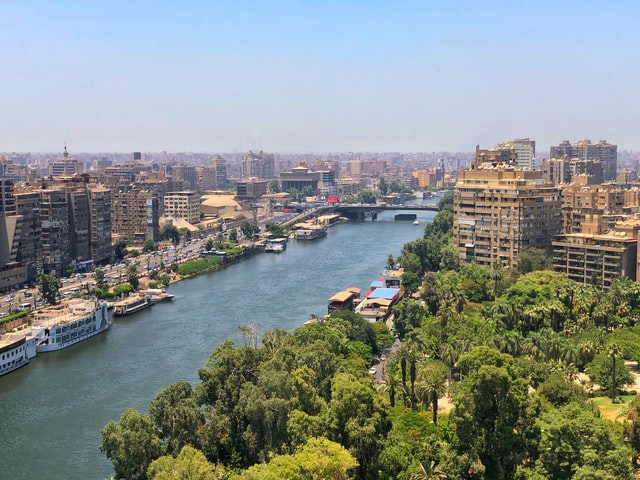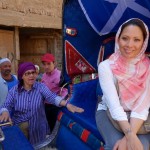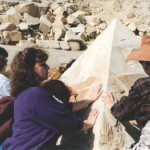My Experience During the Egyptian Revolution

As a frequent traveler seeking new and unique experiences, I jumped on the opportunity to live outside of my home country. When I found out my university could arrange an overseas student teaching experience, applying for the program was a given. This experience sparked a challenging, yet fulfilling chapter in my life.
Imagine landing in a new country and not understanding the language. Imagine the government shuts down Internet and phone services. Add in men running around your street and alleyway with weapons. I had this exact experience after only three weeks in Cairo, Egypt. Believe it or not, I decided to live in Egypt for the next three years. As a foreigner, I witnessed a monumental change in the country during the revolution, and the consequential ones that followed.
Let’s start with the revolution. My experience does not apply to every foreigner living in Cairo during the January 2011 revolution. I lived in a different neighborhood than most expats at that time. The men with weapons running below our balcony turned out to be protecting our building, thank goodness. People were looting everywhere, taking advantage of the change in infrastructure. The men from each building grabbed weapons to keep unwanted visitors out of the building.
It did not feel safe to leave the apartment, especially after watching our doorman rip a man off of his motorcycle because he did not belong on our street.
Our school canceled class once protests started in our neighborhoods. On the first day without school, my roommate and I went to the grocery store. The store was full of people pushing, a line out the door, and empty shelves. We bought enough food to stock our kitchen and hurried home. It did not feel safe to leave the apartment, especially after watching our doorman rip a man off of his motorcycle because he did not belong on our street. We were new—what if people didn’t think we belonged on the street?
Eventually, an Egyptian friend came to pick us up from our apartment. Her mother wanted to make us a home-cooked meal before our evacuation the following day. Suddenly the gunshots seemed less scary because we were among friends. During that ride from my apartment to hers, I saw something that I will never forget. About thirty of the men who had been looting were on their knees naked, hands behind their heads, and the military soldiers were holding guns to their heads. I have no idea what came of the situation. I also know I will never forget that sight.
The next morning, we boarded a bus to the resort town of Sharm El Sheikh on the Red Sea. There was little room on the bus. We were only allowed one backpack. The essentials were packed first: swimsuit, sunscreen, and passport. Before returning stateside to finish my student teaching, I signed a contract to return as a full-time kindergarten teacher in August.
When I returned, I moved to a neighborhood with more foreigners. The first year of teaching went by quickly. I spent my time working, meeting friends at our expat club, and relaxing on my balcony with a cup of tea and the view of the Saqqara Pyramid. My roommate and I would meet after work or at the gym to walk home together because neither of us wanted to walk over what we called the “butt-grab bridge.” Yes, we called it this because of an experience she had had on the bridge.
About thirty of the men who had been looting were on their knees naked, hands behind their heads, and the military soldiers were holding guns to their heads.
To be honest about the butt grabbing, chest touching, and other harassment I experienced, I have found it difficult to be a woman in Egypt. I hate asking my boyfriend if he will walk me to the gym. I feel nervous trusting a cab driver. I have been spit on, and had body parts grabbed. Stares and catcalls are constant. A quick search about news in Egypt proves that these experiences are not unique to me, or even to foreigners.
Egyptian women are some of the toughest, strongest women I have met. A friend of mine was slapped and pushed by the man sitting next to her on a plane. He wanted to stand up, but she could not move because the fasten seat belt sign was illuminated. Immediately, all of the women on the plane were shouting at him, comforting her, and assuring her that Egypt is a safe place to visit regardless of her experience.
I have been spit on, and had body parts grabbed. Stares and catcalls are constant.
As Egyptian women battle this harassment, they learn to be strong while often still relying on a man to feel secure on the streets.
As I consider the negative experiences I had in Cairo, I also remember the fantastic times Egypt has shown me. For every man who deems it appropriate to harass a woman, there are others who will stand up for her. I consistently urge myself as well as others to remember the men who stood outside our building during the revolution, guarding it and the people inside. They protected me regardless of my gender, religion, or nationality.
Photo for My Experience During the Egyptian Revolution by Unsplash.








